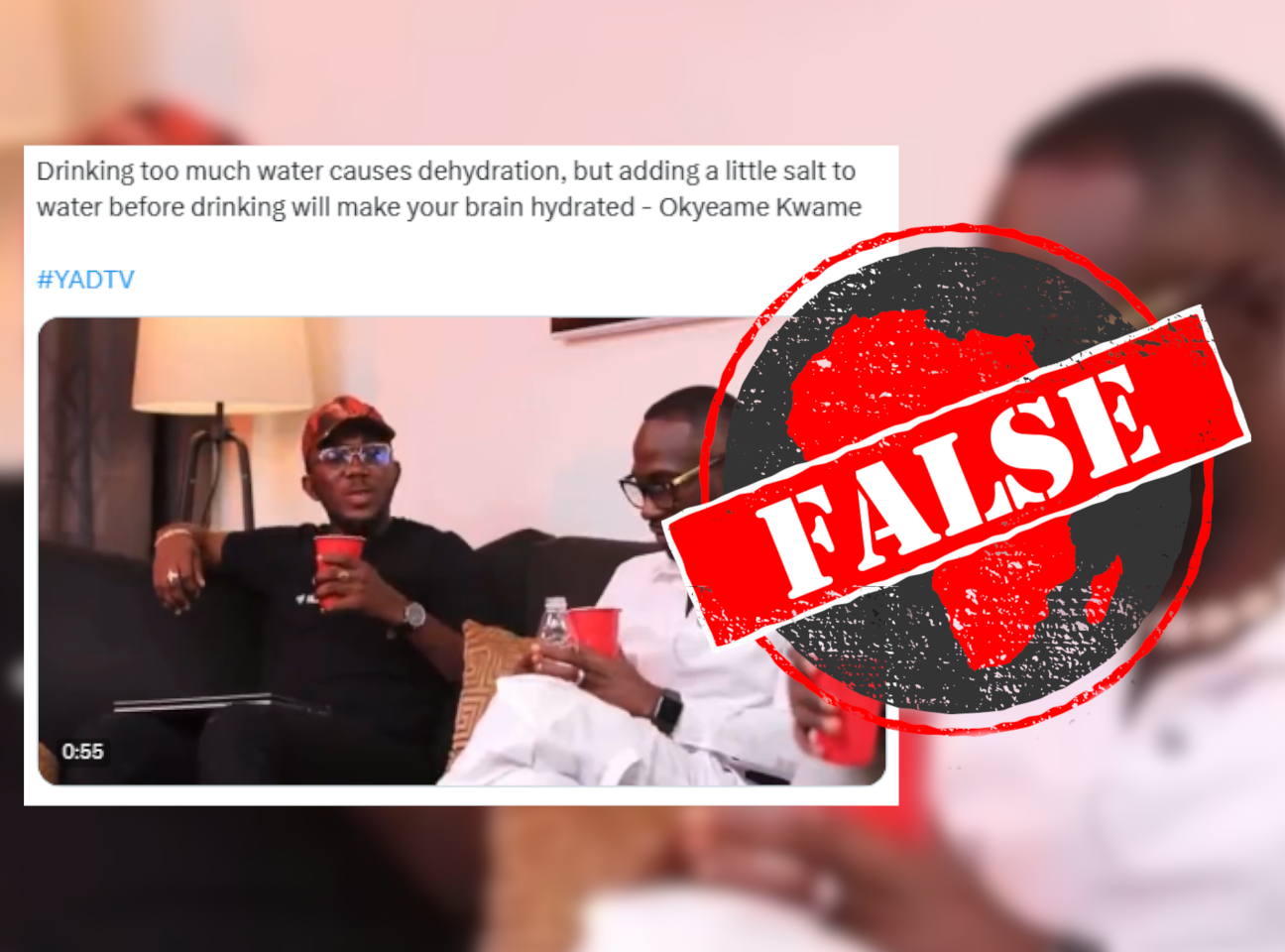IN SHORT: Dehydration can be deadly, especially in babies. A musician’s advice that drinking too much water “will actually make you dehydrated” is misleading and dangerous. It only happens in a rare condition called dilutional hyponatraemia.
Popular Ghanaian musician Okyeame Kwame claims drinking too much water causes dehydration.
His claim is in a video that’s gone viral since late October 2023. One instance, on the social media platform X, previously known as Twitter, has been viewed more than 200,000 times.
“They say you must drink water if you are in a tropical place like Ghana,” Kwame says in the video. “They say drink water. But too much water will actually make you dehydrated.”
Ghana is a country that lies just above the equator in West Africa.
But the musician doesn’t say how much water is “too much”. And this is dangerously misleading advice.

What is dehydration? What causes it?
Dehydration is when your body doesn’t have enough water. It can be deadly, particularly for babies.
Water makes up about 60% of the adult person’s body.
Water nourishes our cells, regulates body temperature, transports nutrients in our bloodstream, helps digestion, flushes out waste, transports oxygen and much more.
Signs of dehydration include dark and strong-smelling urine, peeing less often, feeling dizzy and tired, a dry mouth and headache. Severe dehydration can cause sunken eyes, breathlessness, confusion, a rapidly beating heart and fainting.
If severe dehydration isn’t treated – by drinking fluids or getting an IV drip at a hospital, for example – it can lead to death.
Some experts say you should drink around four to eight glasses of fluid a day to stay properly hydrated. This can be water, but can also include tea, coffee, soft drinks and milk. But the actual amount depends on your body size.
Others say there’s no hard and fast rule, and that we should simply drink fluid when we’re thirsty.
Stuart Galloway, an associate professor in physiology, exercise and nutrition at the University of Stirling in the UK, told the Guardian newspaper that the common advice of six to eight glasses of fluid a day is no longer “considered sensible”.
“As humans, we have this homeostatic system, so when we need water, we feel thirsty,” he said. He added that drinking when thirsty keeps the body’s water system at about 1% to 2% of its ideal state.
Dehydration can be caused by diabetes, vomiting and diarrhoea, being in the sun for too long, drinking alcohol, sweating during physical activity or a fever. Some medicines also make you pee more often.
“Drinking too much water” is not a cause of dehydration – with one extremely rare exception. This is a condition called dilutional hyponatraemia.
Many causes of hyponatraemia
Hyponatraemia or hypotonic dehydration occurs when levels of the electrolyte sodium in your blood are too low. (Salt is about 40% sodium.)
This causes extra water to go into your cells and make them swell. This can be dangerous, as it can even make the brain swell.
Symptoms of hyponatraemia include vomiting, headache, confusion, muscle cramps, irritability and tiredness.
It can be a result of kidney failure, congestive heart failure, vomiting and diarrhoea, liver disease and certain drugs.
On rare occasions it’s caused by water intoxication – overhydration or drinking too much water. This happens when we drink more water than our kidneys can eliminate. The excess water then dilutes the sodium in our bodies, lowering the level of the electrolyte in our bloodstream.
This is dilutional hyponatraemia.
How our bodies stop us from drinking too much water
Reflexes in our bodies prevent us from drinking so much water it would cause us harm. As one study explains: “Causes of this water intoxication include psychiatric disorder, forced water intake as a form of child abuse and iatrogenic infusion of excessive hypotonic fluid.”
In other words, people who get hyponatraemia from drinking too much water generally have a mental illness (often schizophrenia), are forced to drink too much water, or are given too much IV fluid in a hospital.
Drinking water when we’re thirsty is a pleasant experience. Drinking more water when we’ve had enough is unpleasant. A 2014 study found the regions of the brain that activate to cause that feeling of unpleasantness and aversion to overdrinking.
“These regions may contribute to the termination of drinking,” the study reads.
More than this, our brain actually tamps down on our swallowing reflex once we’ve had enough to drink.
This “swallowing inhibition”, a 2016 study found, is likely “a ‘hard-wired’ process that aids maintenance of fluid balance within the body, thereby avoiding the detrimental effects of overdrinking that can cause water intoxication and eventually death”.
“Here for the first time we found effort-full swallowing after drinking excess water which meant they were having to overcome some sort of resistance,” said Michael Farrell of the Monash Biomedicine Discovery Institute in Australia, one of the study’s authors.
“This was compatible with our notion that the swallowing reflex becomes inhibited once enough water has been drunk.”
Dehydration is a potentially life-threatening condition, so it’s good advice to drink water.
The only time drinking “too much” water can lead to dehydration is a condition called dilutional hyponatraemia.
Most people who develop the condition generally don’t have control over the amount of water they drink: they may have mental illness, be victims of abuse, or be given too much fluid in hospital.
Kwame’s advice misses important context. For almost everyone, the best advice is to drink fluids when you are thirsty.
Republish our content for free
For publishers: what to do if your post is rated false
A fact-checker has rated your Facebook or Instagram post as “false”, “altered”, “partly false” or “missing context”. This could have serious consequences. What do you do?
Click on our guide for the steps you should follow.
Publishers guideAfrica Check teams up with Facebook
Africa Check is a partner in Meta's third-party fact-checking programme to help stop the spread of false information on social media.
The content we rate as “false” will be downgraded on Facebook and Instagram. This means fewer people will see it.
You can also help identify false information on Facebook. This guide explains how.



Add new comment